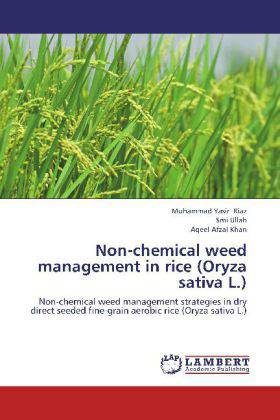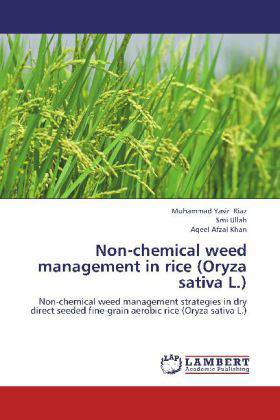
Bedankt voor het vertrouwen het afgelopen jaar! Om jou te bedanken bieden we GRATIS verzending (in België) aan op alles gedurende de hele maand januari.
- Afhalen na 1 uur in een winkel met voorraad
- In januari gratis thuislevering in België
- Ruim aanbod met 7 miljoen producten
Bedankt voor het vertrouwen het afgelopen jaar! Om jou te bedanken bieden we GRATIS verzending (in België) aan op alles gedurende de hele maand januari.
- Afhalen na 1 uur in een winkel met voorraad
- In januari gratis thuislevering in België
- Ruim aanbod met 7 miljoen producten
Zoeken
Non-chemical weed management in rice (Oryza sativa L.)
Non-chemical weed management strategies in dry direct seeded fine-grain aerobic rice (Oryza sativa L.)
Muhammad Yasir Riaz, Smi Ullah, Aqeel Afzal Khan
Paperback | Engels
€ 62,45
+ 124 punten
Omschrijving
A field trial to compare the non-chemical weed management approach in dry direct seeded fine rice with the chemical methods was conducted at the Agronomic Research Farm, University of Agriculture, Faisalabad during Kharif, 2009. The experiment was laid out in randomized complete block design (RCBD) with four replications. Results revealed that manual weeding recorded maximum (99 %) reduction in total weed density and dry weight. Nominee 100SC suppressed weed density and dry weight by 75% over control. Among non-chemical weed management strategies, soil incorporation of sorghum residues at 8 t ha-1 accounted for 52 and 58 % reduction in above said weed attributes. Maximum yield (4.17 t ha-1) was recorded by manual weeding. Manual weeding gave highest net benefits (Rs. 127217 ha-1), while Nominee 100SC scored maximum (23076 %) marginal rate of return.
Specificaties
Betrokkenen
- Auteur(s):
- Uitgeverij:
Inhoud
- Aantal bladzijden:
- 120
- Taal:
- Engels
Eigenschappen
- Productcode (EAN):
- 9783848433674
- Verschijningsdatum:
- 26/10/2012
- Uitvoering:
- Paperback
- Afmetingen:
- 150 mm x 220 mm
- Gewicht:
- 186 g

Alleen bij Standaard Boekhandel
+ 124 punten op je klantenkaart van Standaard Boekhandel
Beoordelingen
We publiceren alleen reviews die voldoen aan de voorwaarden voor reviews. Bekijk onze voorwaarden voor reviews.









